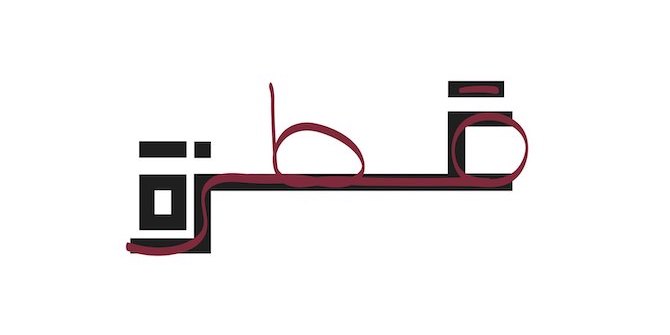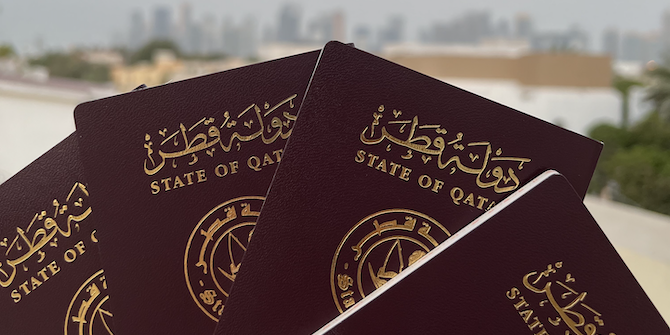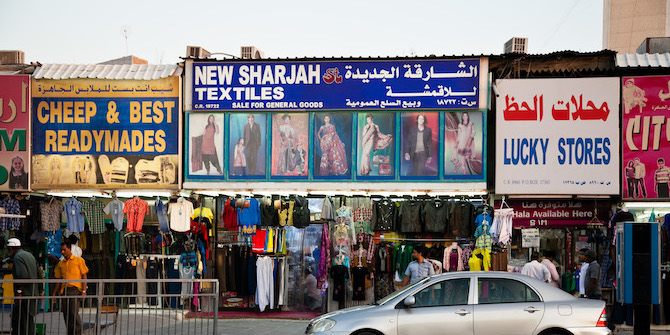by Noora Al-Saai

The jus sanguinis (right of blood) principle as a basis for nationality entitlement and conferral has been adopted by many legislations around the world. This principle relies on the genetic model as a basis for legal membership in the nation-state; whereby a person becomes a national of a state when one of their parents is also a national. In the GCC region, nationality laws are based on a particular kind of genetic model; that of customary Arab kinship, which rely on patrilineality as a basis for kin group-membership.
This reliance manifests in a number of ways across the Gulf, the most prevalent of which is that only a male national transmits his nationality by default. Although this rule itself originates from the earliest French nationality model before it was amended, Parolin has noted that these rules held sway in the region particularly because they were in accordance with ‘local legal environment’. Hence, GCC laws are yet to be amended to allow the transmission of nationality by women, even when these changes took place in the contexts from which these laws were transplanted. Nevertheless, the particularities and extent to which the model of kinship is taken up in GCC nationality laws differs depending on the country. For example, Alanoud Alsharekh has provided a rich account of the Kuwaiti context. In this post, I focus on the Qatari case.
In all GCC countries but Qatar, women may transmit their nationality in some exceptional cases, such as when the father is stateless, unknown, or when fatherhood is not substantiated, although the extent to which this is applied in practice varies. In 2017 an amendment to the UAE nationality law also allowed women to petition for nationality outside of these exceptions when their children from foreign husbands turned six years old (art 10r).
Under Qatari and Emirati laws, the patrilineal model also translates into male nationals’ transmission of the type of nationality status they hold to their children. In other words, a male national who is considered ‘naturalised’ under the law passes on his naturalised status to his children, even those born after his naturalisation. This rule is a departure from established practice in private international law, which dictates that a person who is ascribed nationality at birth is considered to have ‘original nationality’, which is a logical arrangement since they do not have a prior nationality. Hence, even under Qatari law (arts 3 & 4), only those children of naturalised nationals who were minors when Qatari nationality was ascribed to them, and not those who were ascribed it upon birth, are offered the choice to give up their Qatari nationality for their ‘original nationality’ when they reach the age of majority. This is perhaps a tacit acknowledgement that those to whom the nationality is ascribed at birth carry no prior ‘original nationality’, and thus cannot choose it.
On the contrary, the Qatari law ties Qatari ‘original nationality’ to certain categories of people and their descendants; those present in the country prior to 1930 and have maintained regular residence until 1961; those to whom the nationality was reinstated; those who are deemed of ‘Qatari origins’ by an Emiri Decree, and the descendants of the previous categories. The equivalent category in UAE law is ‘nationality by law’, which is reserved to those of Arab origin who were present in any of the emirates in 1925. This excludes those of non-Arab origins regardless of their date of residence from being considered original nationals. In comparison, while in Kuwait there are also levels of nationality, the nationality law stipulates that a child born to a naturalised national has original nationality (art. 7).
In both Qatar and the UAE, only those who are considered to have ‘original status’ are allowed to participate in legislative elections, both for voting and candidacy. In Qatar, the elections law of 2021 which animated the distinctions contained in the 2005 nationality law, allowed for an exception whereby the third generation of ‘naturalised’ nationals – whose paternal grandfathers were born in Qatar – can vote, but not become members of the Shura Council. In comparison, a Kuwaiti naturalised national’s voting and membership rights are frozen for 20 years, but this does not extend to his children. A Qatari national’s nationality status also determines the level of their access to housing benefits, as a national who holds original status is entitled to the full package of a land grant and a loan, whereas a naturalised national is entitled to a loan only, although in practice other factors also contribute to a national’s degree of access, gender among them. Furthermore, those who hold naturalised status may be stripped of nationality on more grounds than those who have original nationality.
Qatari law also takes up the Arab kinship model to a further extent than its neighbours in relation to foundlings, who are afforded Qatari nationality but are considered naturalised; since they cannot establish their origin and descent. This parallels Islamic kinship rules of the affiliation of adopted children. Furthermore, as a further means of regulating nationality and residence in the country and who has access to it, marriages to non-GCC foreigners are proscribed in Qatar for certain categories of government employees and for students abroad, and is subject to approval for Qatari men and women who do not belong to these categories. The supervision of nationals’ marriage choices by the state is akin to the tribe’s monopoly over its biological and social reproduction, and its preference for endogamy. With these laws, the state not only limits and decides who gets to access nationality, but also who gets to reproduce the nation.
Several scholars have noted the valorisation and resurgence of tribalism in Qatar, which is apparent from, inter alia, the change of the occasion celebrated as the national day in 2007 to the day commemorating the unification of Qatari tribes behind the founder Sheikh Jassim as the leader of Qatar, the promotion of tribal ceremonies which accompanied national day celebrations before the 2017 Gulf Crisis, and the reliance on a tribal electoral system for the Shura Council elections. All of these officially backed practices reinforced the notion that national identity relies on one’s tribal or familial identity, which is by default patrilineal. When the sponsoring of tribalism almost backfired during the 2017 Crisis, the public’s response to establish the precedence of nationalism over tribalism on social media was to change their family names to Al Qatari or use the hashtag Qabiliti Qatar (my tribe is Qatar); stressing that Qatar was the ‘super-family’, simultaneously reproducing the tribalist discourse while attempting to counter it.
This reliance on patrilineages as a source of one’s national identity and the basis for determining their electoral constituency for voting (a semi-confessional system means vote shares are often determined by tribe, ethnicity or sect), a right tied to their citizenship, along with discourses that use the tribe as a metaphor for the nation-state, such as Qatari nationals’ response to the Gulf Crisis on social media, naturalises certain aspects of the nationality law. More specifically, by relying on the imagery of patrilineal kinship as a basis for national identity, it essentialises nationality and make the current rules appear as if they reflect a natural, common-sense arrangement. In other words, just as one’s tribal or familial affiliation (which locally is interchangeable with or revealing of their tribal or ethnic ‘origin’) is determined through paternal descent, despite a person being biologically related to both their parents equally, one may receive their national identity – including their status as original or naturalised – exclusively through their father, and this received identity is made inherent. Indeed, states sometimes deliberately conflate the two domains of nationality and kinship in international fora to justify their nationality laws. However, the extent to which this analogy is taken up locally is a different question.
In my master’s dissertation completed in 2018 at the LSE, I asked participants via an online survey whether Qatari women should have the right to pass on their nationality to their children. The survey yielded 660 responses, including 511 by Qatari nationals, most of which were in favour of women transmitting their nationality. Those against were a minority amongst respondents, and they mostly formulated their opposition on the basis of nasab; that children were affiliated to their father in their names, and the same should naturally be the case for nationality. Others raised concerns around the impact on demography or simply stated that Qatari women’s offspring are foreigners and therefore should not have nationality, reflecting a view of the offspring of Qatari women and foreign men as inherently non-Qatari, and of their father’s identity as extending onto them.
Nevertheless, the majority of respondents were in favour, framing their arguments by relying on the discourse of rights, mainly through invoking the equality articles enshrined in the constitution, and internationally recognised human rights of women and children. Others took a sympathetic view based on religious or humanitarian considerations. Although the question was generally phrased, many of the respondents felt the necessity to stress the separation between nationality as a legal category, and nasab as documenting a biological link, an indication that this analogy was widely popular. One respondent even referred to a hadith where the child of a woman is considered a member of her siblings’ kin-group.
The survey responses parallel wider and continuous discussions on Twitter and in scholarship which rely on the discourse of constitutionality, human rights or religion to support or discredit a given position about Qatar’s nationality rules regarding naturalisation or women. For example, while rooting her argument in religion, Maitha Al-Marri has steered away from the analogy of nasab, and relied instead on the analogy of Muslim citizenship in Dar Al-Islam. She argues that Qatari women should be able to transmit their nationality because Muslim women were allowed to pass on their Muslim citizenship to their children from non-Muslim husbands, who either renounced Islam or did not convert with their wives.
In conclusion, while the state reinforces and benefits from the similarity between the two domains of nationality and kinship, this analogy is not necessarily adopted locally, as along with the discourses which reproduce it there are contestations which refute it.






